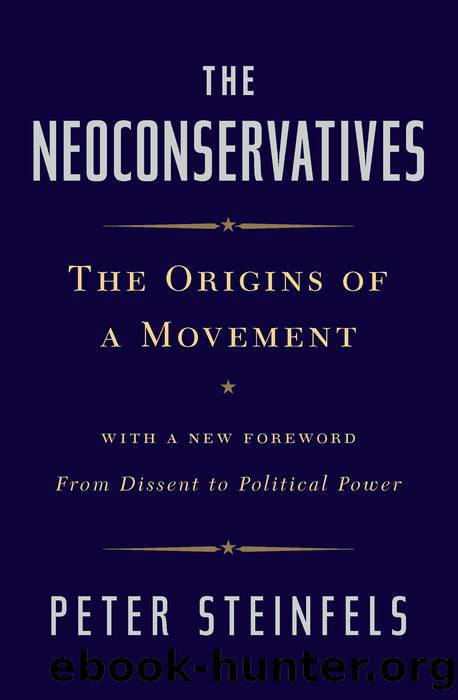The Neoconservatives: The Origins of a Movement by Peter Steinfels

Author:Peter Steinfels
Language: eng
Format: epub
ISBN: 9781476729701
Publisher: Simon & Schuster
Why Neoconservative?
The first question is essential. To a large extent, Bell has been labeled a neoconservative because he runs with the neoconservatives. Kristol is an old friend, whom Bell repeatedly cites as such. His references to Kristol, with whom he founded The Public Interest, to Seymour Martin Lipset, a collaborator on several projects, to Samuel P. Huntington, a colleague at Harvard, to Herman Kahn, and to other neoconservatives almost always express agreement. If he takes exception to some of their views, the difference has not been such as to provoke him to public criticism. And yet it must be acknowledged that Bell adamantly refuses the neoconservative classification. The âdesignation is meaningless,â he writes; it is a tag created by book reviewers and journalists to label work that otherwise resists labelingâa ânew cultural criticismâ that âseeks to transcend the lines of the present debates and to present the dilemmas of the society within a very different framework.â
Bell is not at all evasive about what, if not a neoconservative, he actually is: âI would say, quite seriously, that I am a socialist in economics, a liberal in politics, and a conservative in culture.â
What this means, first of all, is that Bell believes in the welfare state: a societyâs economic policy should âestablish that âsocial minimumâ which would allow individuals to lead a life of self-respectâ and should provide âwork for those who seek it, a degree of adequate security against the hazards of the market, and adequate access to medical care and protection against the ravages of disease and illness.â This is closer to âwelfare liberalismâ than to socialism: it says nothing about workersâ control over their own output and the conditions of production; it says nothing about the tendency of market capitalism to transform human relations into âcommodities.â Bell does approach socialism in his belief that wealth should not âbe convertible into undue privilege in realms where it is not relevantâ: he does not spell out the implications of this principle, but judging from the reference in his argument (an article by Michael Walzer in the socialist journal Dissent), such a limitation on the power of money might very well require major economic reforms.
As âa liberal in politics,â Bell believes (1) that the individual and not the group must be the primary unit of a political system; (2) that beyond the point of a âsocial minimum,â rewards and position in society should be determined by individual achievement, âthe criterion of merit,â rather than being inherited or prescribed or allocated by ânumerical quotaâ; (3) that a distinction must be maintained between the public and the private realms, âso that not all behavior is politicizedâ; (4) that political power, barred from the private realm, should govern the public one according to the ârule of law which applies equally to all, and is therefore procedural: it does not specify outcomes between individuals.â
By âa conservative in culture,â Bell means that he respects tradition, believes âin reasoned judgments . . . about the qualities of a
Download
This site does not store any files on its server. We only index and link to content provided by other sites. Please contact the content providers to delete copyright contents if any and email us, we'll remove relevant links or contents immediately.
| Anarchism | Communism & Socialism |
| Conservatism & Liberalism | Democracy |
| Fascism | Libertarianism |
| Nationalism | Radicalism |
| Utopian |
The Secret History by Donna Tartt(19032)
The Social Justice Warrior Handbook by Lisa De Pasquale(12182)
Thirteen Reasons Why by Jay Asher(8884)
This Is How You Lose Her by Junot Diaz(6872)
Weapons of Math Destruction by Cathy O'Neil(6261)
Zero to One by Peter Thiel(5782)
Beartown by Fredrik Backman(5734)
The Myth of the Strong Leader by Archie Brown(5491)
The Fire Next Time by James Baldwin(5424)
How Democracies Die by Steven Levitsky & Daniel Ziblatt(5211)
Promise Me, Dad by Joe Biden(5141)
Stone's Rules by Roger Stone(5079)
A Higher Loyalty: Truth, Lies, and Leadership by James Comey(4946)
100 Deadly Skills by Clint Emerson(4911)
Rise and Kill First by Ronen Bergman(4776)
Secrecy World by Jake Bernstein(4738)
The David Icke Guide to the Global Conspiracy (and how to end it) by David Icke(4697)
The Farm by Tom Rob Smith(4500)
The Doomsday Machine by Daniel Ellsberg(4481)
